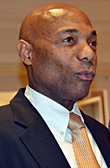| Source: Date: Updated: |
TheBahamasInvestor.com
Wednesday, October 26, 2011 Wednesday, October 26, 2011 |
 The International Monetary Fund’s (IMF) Regional Economic Outlook has proven to be an “invaluable tool” for helping governments construct microeconomic frameworks, which form the basis of their fiscal plans, says Ehurd Cunningham (pictured), acting financial secretary in the Ministry of Finance.
The International Monetary Fund’s (IMF) Regional Economic Outlook has proven to be an “invaluable tool” for helping governments construct microeconomic frameworks, which form the basis of their fiscal plans, says Ehurd Cunningham (pictured), acting financial secretary in the Ministry of Finance.
On Tuesday, representatives from the IMF presented one of their flagship publications, the Regional Economic Outlook, to a Bahamian audience. The presentation took the form of a panel discussion.
It comes at a time when the world economy is in the midst of a turbulent period with growth and confidence being negatively affected by the sovereign debt crisis in the European Union and high unemployment in some developed and developing countries.
“Nevertheless, governments have to operate in this environment and put in place policies that will lead to growth over the short and medium term,” says Cunningham. “One of the pre-requisites for survival in such an environment is that a government has to rely on information and data to help construct policy positions and navigate the course.”
The IMF’s latest report indicates that countries with strong policies– exchange rate flexibility, along with sound external and fiscal positions– fare better.
“If we focus on the macro, clearly we need to think of how to reduce the debt.  We need to think about how to raise the growth levels and we need to think of addressing financial sector vulnerabilities,” says Gene Leon (pictured), the IMF’s senior resident representative in Jamaica and Mission Chief for The Bahamas. “Those are the three key areas. They remain difficult things to handle.”
We need to think about how to raise the growth levels and we need to think of addressing financial sector vulnerabilities,” says Gene Leon (pictured), the IMF’s senior resident representative in Jamaica and Mission Chief for The Bahamas. “Those are the three key areas. They remain difficult things to handle.”
According to IMF predictions, The Bahamas is expected to experience a moderate two per cent growth this year and 2.5 per cent in 2012.
“We see that the economy is continuing to recover. The tourism sector’s performance has improved.  Although the US recovery has been anemic, it’s been enough to sustain the tourist market,” says Alwyn Jordan (pictured), the Central Bank of The Bahamas’ senior economist.
Although the US recovery has been anemic, it’s been enough to sustain the tourist market,” says Alwyn Jordan (pictured), the Central Bank of The Bahamas’ senior economist.
Admitting to challenges in terms of the tourist stopover market, Jordan notes that hotel occupancy rates are still “relatively high” and hotel earnings continue to increase, although still below 2008 levels.
tblair@dupuch.com










